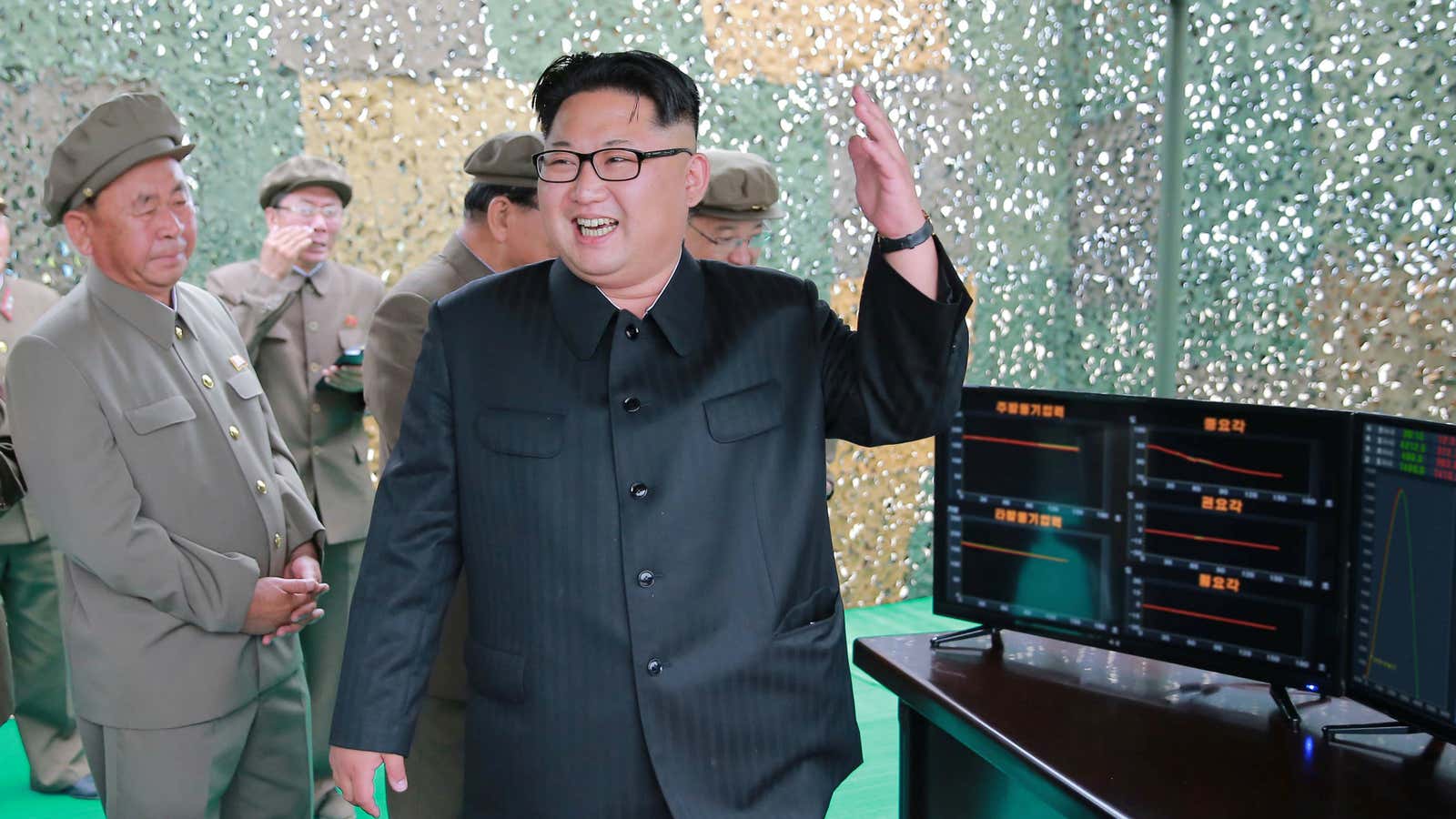On Jan. 1 North Korean leader Kim Jong-un revealed in his annual New Year’s address that the country had reached the final stages to prepare for a test launch of an intercontinental ballistic missile. As news of the speech spread overseas, US president-elect Donald Trump weighed in on Twitter, his preferred mode of communication.
In slamming China, Trump is not straying too far from the Obama administration’s assumption that Beijing is the key to managing North Korea. That assumption merits a closer look.
China has dragged its feet when it comes to helping curb North Korea’s nuclear ambitions, by weakly implementing the sanctions it has agreed to impose on the country. If Trump’s hostile rhetoric toward China gets turned into policy, Beijing will be even less likely to help the US denuclearize North Korea—especially since keeping the status quo in North Korea in many ways aligns with China’s interests.
A collapsed or unstable North Korean regime could be preceded by political and economic chaos in the country, leading to an influx of hundreds of thousands of refugees into northern China. Many of these escaped citizens would not speak Chinese, and thanks to living in a backward economy for decades, they’d possess few employable skills. Unless the Chinese government granted them a special status, they’d likely fall into a life of crime or marginalization. Up to 90% of female North Korean refugees in China are victims of some form of human trafficking.
Meanwhile, a fallen North Korea poses the risk that the South Korea military might move into the country, and, if it traverses further north, place troops along China’s borders. The possibility of conflict perpetually looms over the region, given ongoing tensions in the East China Sea and South China Sea (including the Taiwan Strait). Since South Korea is a democratic ally of the US, a unified or unstable North Korea poses the threat that a geopolitical adversary could more easily advance its forces toward China.
As a result, China has addressed North Korea’s nuclear aggression grudgingly at best, given its economic influence in the country. The government “will only tolerate and support sanctions to the extent they do not undermine stability in North Korea,” says Bonnie Glaser, senior advisor for Asia at the Center for Strategic and International Studies.
The Obama administration has relied on China to help manage North Korea by rallying for economic sanctions. Most of the consumer goods and raw materials brought into North Korea come from China, which accounts for 70% (pdf, p. 8) of the nation’s total trade volume. That makes China’s participation essential to the success of a sanctions-centric North Korea strategy.
But China has remained the most vocal opponent of aggressive sanctions. The UN imposed two rounds of sanctions against North Korea during the Obama administration, the first in 2009 and the second in 2013. Analysts say these actions were too weak to be effective, due to pushback in the UN from China.
In March 2016, three months after North Korea claimed to test a hydrogen bomb, China cooperated with stricter sanctions—most notably, regulations calling for the restriction North Korean exports of coal to China. But the Chinese softened the sanctions’ potential impact by taking advantage a “livelihood purposes” clause. The clause was intended to allow trade that could be proven to benefit the livelihood of the North Korean people. Yet China found ways to use it as a loophole and continue its coal imports, Glaser explains, which rattled the US state department.
Antony Blinken, the US deputy secretary of state, said in November 2016:
“The plain language of [the regulation] makes it very clear that the export of coal, or the importation of coal if you are China, is prohibited unless you can demonstrate that the transaction in question goes to the livelihood of the North Korean people… The Chinese have reversed the presumption and their approach has been that the trade in coal is allowed unless you can demonstrate that it is going to the weapons program.”
Meanwhile, others argue that despite its economic power over North Korea, China’s ability to influence Pyongyang politically is weaker than the US and UN might assume. John Delury, associate professor of Chinese Studies at Yonsei University, notes that in Kim’s annual New Year’s speech, the leader didn’t mention China once—a sign of his ambivalence toward the giant neighbor.
“Koreans historically have seen the Chinese as this big threatening huge power that they need to have a good relationship with, but also need to keep at bay,” he says. “The Chinese don’t act in North Korea’s interest, they act in China’s interest, and [the North Koreans] feel that they could easily feel betrayed by them.”
If pushing China to impose sanctions on North Korea is a dead end, what options does Trump have? The US and the UN could resume diplomatic talks with Pyongyang, after they officially came to a halt in 2009. But those discussions may be no more successful now than they were in the past.
